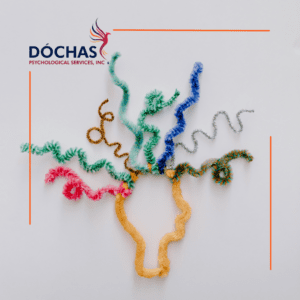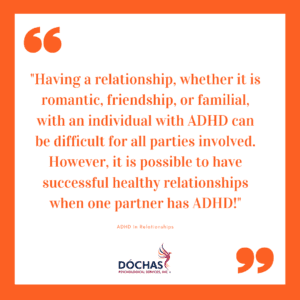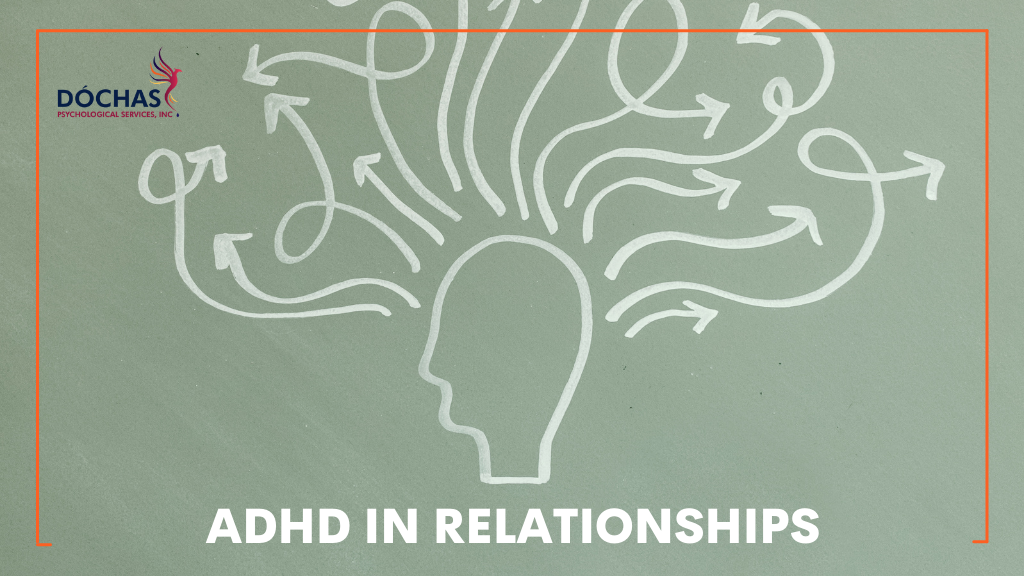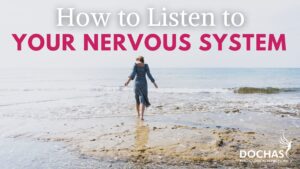Hello, It’s Rachael on the Dóchas blog, and I’m here to share more about Attention-Deficit Hyperactivity Disorder (ADHD). In my previous blogs, I discussed what ADHD is and what it means to have ADHD as an adult. Today I will focus on the impact ADHD can have on interpersonal relationships—because ADHD can have a major impact!
For the partner who doesn’t have ADHD, the behaviour of the person they love can be frustrating or mysterious. And for the person with ADHD, they might struggle to understand how to manage symptoms in a way that doesn’t impact their relationships with other people
Being introduced to ADHD
When you first start interacting with an individual with ADHD, whether in a romantic way or a friendly way, it may be very exciting. They might seem fairly typical, just a little more energetic, exciting, and more engaging with you than you are used to. However, as time goes on, you may notice you are becoming exhausted by them constantly being on the go, and you may have more frustration about their forgetfulness or if their level of interaction with you starts to decrease.
This is due to the symptoms of ADHD being minimal or absent when individuals with ADHD are present with novel situations, engaged in interesting activities, have constant external stimulation, or interact in one-on-one situations. As time goes on, the relationship is no longer all of these things and the symptoms of ADHD become more prevalent. When the symptoms of ADHD present in relationships it can result in discord, negative interactions and poor self-esteem. Children often experience peer rejection, neglect or teasing. Knowing how the symptoms can impact social interactions can allow us to intervene and better manage interactions to help improve interpersonal interactions.

Presentation of inattention in interpersonal relationships:
Trouble paying attention: An individual with ADHD may zone out during conversations, may miss important details, or mindlessly agree to something. Due to this, the person they are interacting with may feel ignored or frustrated when things are not done that they thought were agreed to. The negativity experienced by one party in the interaction can result in negative feelings for the other individual and create discord.
Forgetfulness: Even if they are paying attention, someone with ADHD may forget what was discussed. It is easy to feel like the person with ADHD is unreliable. Examples might be that it looks like they don’t care if they forget to pick something up on the way home, or miss an important event like a birthday.
Poor organizational skills: ADHD individuals often struggle to finish tasks. They may start a task and then part way through remember another task and move on. For example, while they are doing the dishes they might throw something out; they then realize the garbage needs to get taken out, so they switch tasks, leaving the dishes incomplete. For those who share the environment with an individual with ADHD, it can result in frustration as they feel like they are always cleaning up after the other person and always having to finish the tasks for them.
Presentation of hyperactivity in interpersonal relationships:
In children, hyperactivity generally means very active kids who are constantly moving. This can make the classroom environment difficult, as it requires sitting for long periods of time. The peers who don’t experience this may get annoyed by the individual with ADHD who is fidgeting or can’t stay seated.
As individuals with ADHD transition into adulthood, hyperactivity often changes into extreme restlessness. Adults with ADHD are often described as “energizer bunnies.” For some individuals, it means working excessively or keeping a busy schedule filled with outings and hobbies. Sitting down to relax and watch a movie can be a very difficult task when you are feeling restless. For individuals without ADHD, keeping up with the activity and schedule of an individual with ADHD can be really exhausting. For the individual with ADHD, it can be difficult to feel the need always to be going and doing, and sometimes it is frustrating when their partners don’t want to participate in activities with them, or they need a break.
Presentation of impulsivity in interpersonal relationships:
Impulsivity results in hasty actions that occur at the moment, including social intrusiveness. Social intrusiveness, like interrupting others or blurting things out without thinking, can result in unintentionally hurting others’ feelings. Social intrusiveness can also include struggling to wait for one’s turn, such as waiting in line at a checkout, which increases frustration for both parties.
Impulsivity can also include making important decisions without consideration of long-term consequences. Examples of these decisions could be quitting one’s job without being prepared or making a big purchase that isn’t in the budget. These types of decisions can easily result in frustration and arguments in any relationship.
Individuals with ADHD may also experience emotional impulsivity and struggle with regulating their emotions. This means they may struggle to express their emotions, lose their temper easily, or have trouble discussing issues calmly. For their partner, this can make it feel as if they have to walk on eggshells due to being unsure of how their partner will react.

Moving forward
Having a relationship, whether it is romantic, friendship, or familial, with an individual with ADHD can be difficult for all parties involved. However, it is possible to have successful healthy relationships when one partner has ADHD! It is important to develop an awareness of the symptoms of ADHD’s impact on the relationship and work on communication and emotion regulation skills. Working on these skills can be done by supporting individuals during social interactions, rewarding good behaviour, and providing one-on-one support. Resources like support groups and individual therapy can also be very beneficial. If you or a loved one is really struggling with understanding how to cope with ADHD or if you just want to check in to ask questions, I encourage you to ask us how we can help. You can contact us here by calling us at 780 446 0300 or emailing info@dochaspsychologicalservices.com.
Other resources on the blog about ADHD:
- ADHD and Anxiety: The Wacky Duo Shaking Up Your School Life!
- What is ADHD?
- What Does It Mean to Have ADHD in Adulthood?
About Dóchas Psychological
Dóchas Psychological Services is a well-established and trusted therapy clinic located in Spruce Grove, Alberta. At Dóchas we value the idea that everyone deserves a safe space. Through connection and education, our team works hard to build a trustworthy relationship with each of our clients. It is our goal to create a community for our clients to feel like they belong.
Disclaimer
Information provided through Dóchas Psychological Services blogs or vlogs is meant for educational purposes only. They are NOT medical or mental health advice. You can read more about our disclaimer here.









